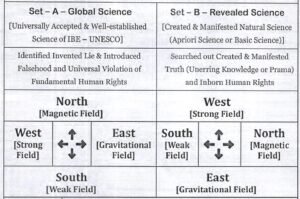
Nature has long been explained through sets of fours. Science recognizes four fundamental fields, four basic forces, four gross elements, and four cardinal directions. Together, they provide the foundation for how we understand the universe.
- Four Fields: gravitational (earth), strong (water), magnetic (fire), and weak (air)
- Four Forces: gravitational, strong, magnetic, and weak
- Four Elements: earth (soil or bottom), water (rain or top), fire (light or equal & opposite left and right), and air (wind or equal & opposite right and left)
- Four Directions: east, west, north, and south
This neat framework seems complete—until we stand upright on solid ground and look around. At that moment, we don’t just sense four directions. We also recognize six cardinal directions in pairs:
- Top and bottom
- Left and right
- Forward [Upward] and backward [downward]
Here lies the contradiction: How can the universe be structured around four directions if our lived experience shows six? Does this mean there are actually two Norths and two Souths, or even two Easts and two Wests? Or does it suggest that the global standard of four cardinal directions is, in itself, paradoxical?
This question opens up deeper scientific and philosophical inquiry. If the very basics of how we describe directions are inconsistent, then how do they align with the four fundamental forces of the universe? Can mathematics provide an answer, or are we dealing with a conceptual gap in our current understanding?
Jamir Ahmed Choudhury raises these questions not as abstract puzzles but as challenges to accepted scientific thought. By pointing out contradictions between natural facts and human perception, he invites readers to rethink what we take for granted about the world.
The six-direction experience versus the four-direction model is more than a simple conflict of terms—it is a reminder that science, too, must constantly re-examine its foundations.
The denial of ‘creation in pairs’ is equivalent to accepting that ‘nature’s equal & opposite apriori paradigm’ is the fundamental, undeniable and self-evident truth.













